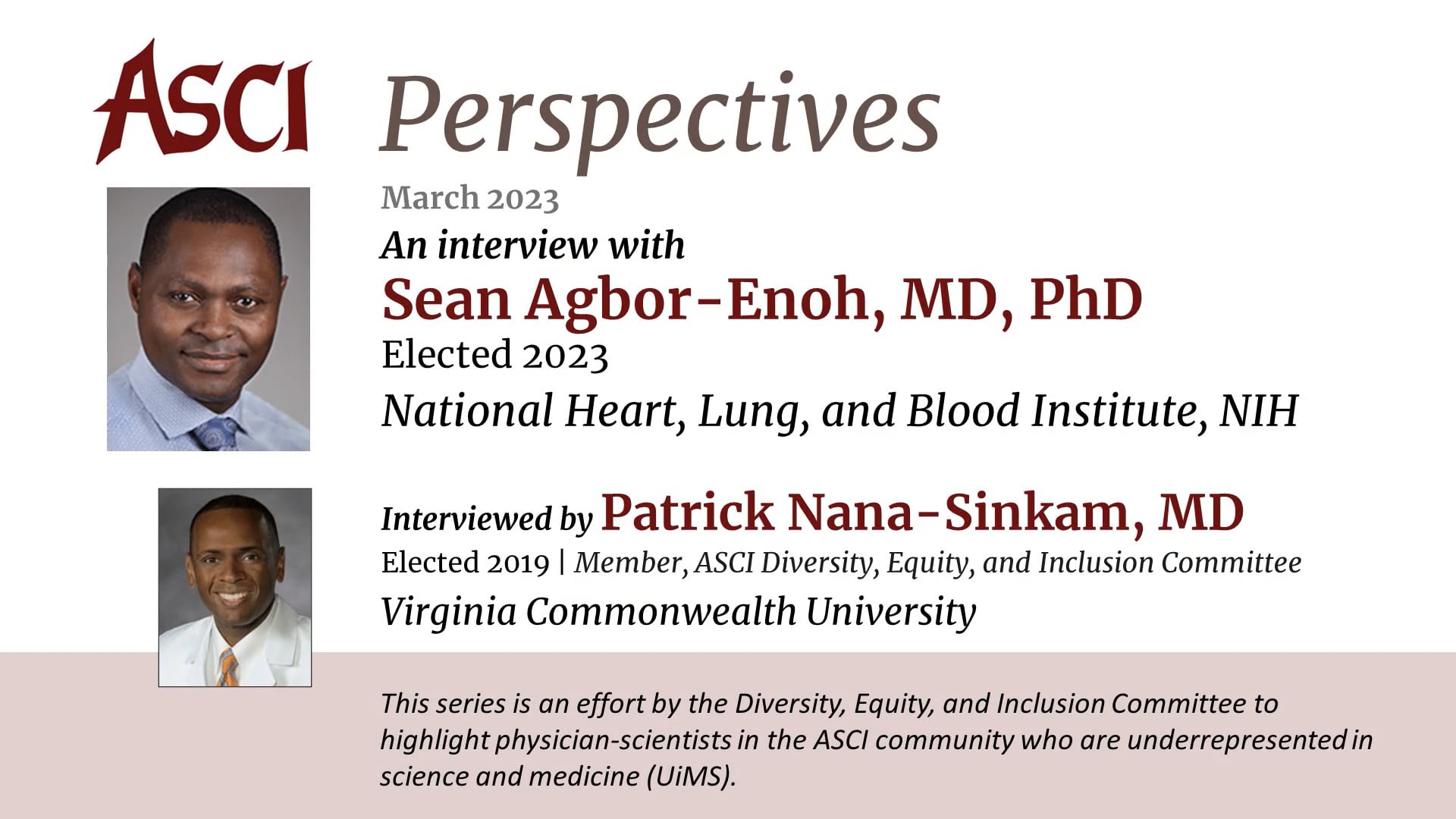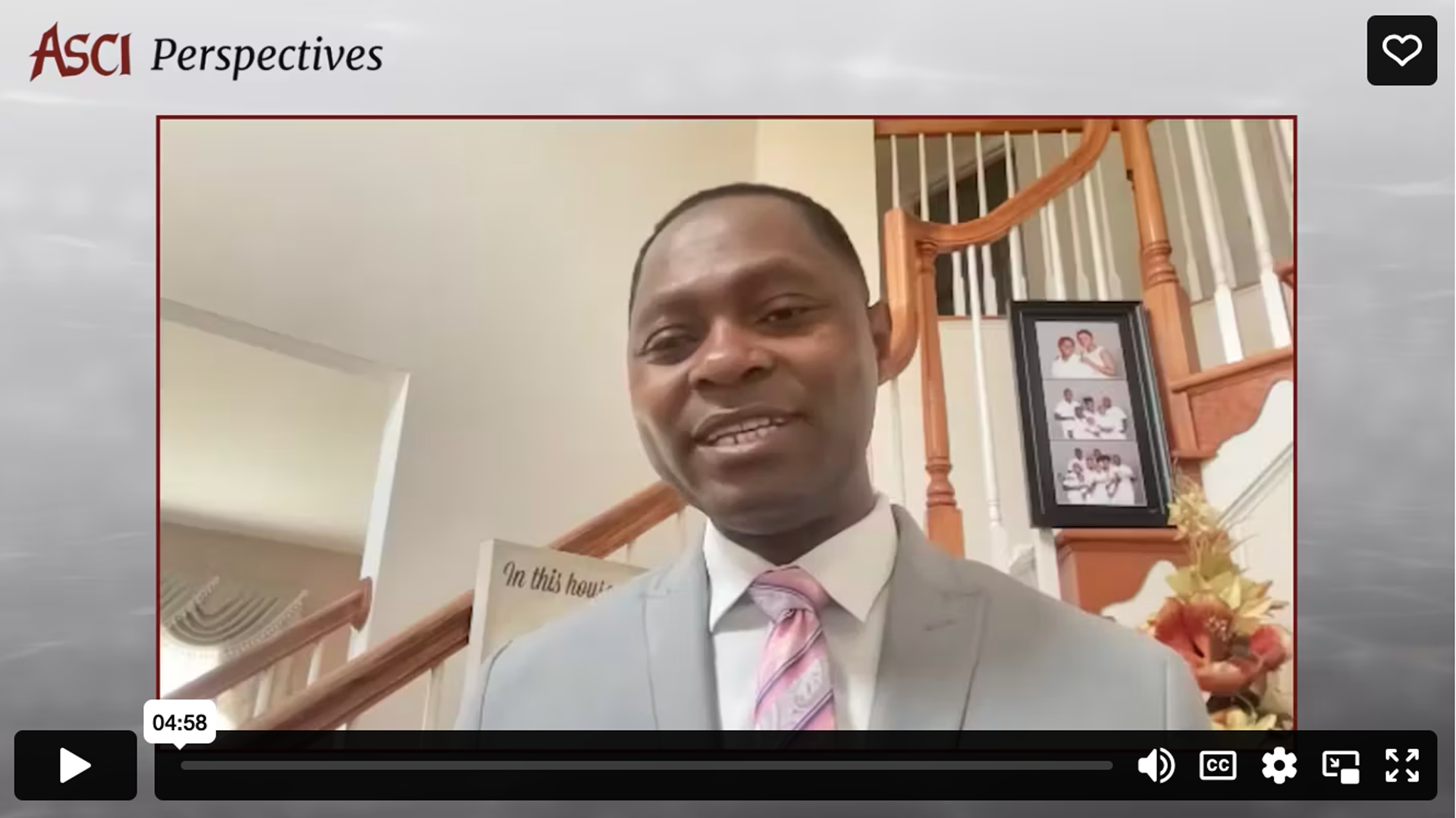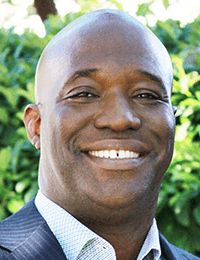PSEC member Dr. Patrick Nana-Sinkam interviewed lung transplantation researcher and 2023 ASCI inductee Sean Agbor-Enoh, MD, PhD (view profile). Dr. Agbor-Enoh is Laboratory Chief, NIH Lasker Clinical Tenure Track Investigator, and NIH Distinguished Scholar, Laboratory of Applied Precision Omics (APO) Division of Intramural Research, NHLBI-NIH; Lead Investigator and Director, Genomic Research Alliance for Transplantation; and Adjunct Associate Professor of Medicine, Lung Transplant Program, Johns Hopkins Hospital. His team has developed cell-free DNA (cfDNA) approaches that reliably detect transplant rejection at an earlier stage than biopsy. Dr. Agbor-Enoh relates the influences of his early background on his current work, surprises and discoveries in his research on lung transplantation, and how these findings can be applied for other medical conditions — while offering advice and encouragement to young physician-scientists and colleagues. — Posted March 2023
Month: March 2023
The 2023 Harrington Prize for Innovation in Medicine: Jean Bennett, MD, PhD, and Albert M. Maguire, MD
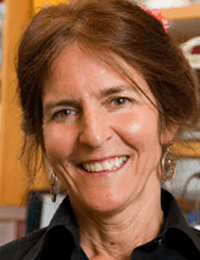
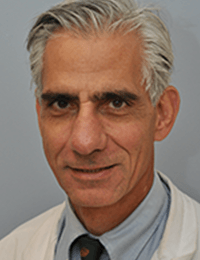
The tenth annual Harrington Prize for Innovation in Medicine has been jointly awarded to Jean Bennett, MD, PhD, the F.M. Kirby Emeritus Professor of Ophthalmology and Cell and Developmental Biology at the Perelman School of Medicine at the University of Pennsylvania, and Albert M. Maguire, MD, the F.M. Kirby Professor of Molecular Ophthalmology at the Perelman School of Medicine at the University of Pennsylvania. The award recognizes this team’s groundbreaking translational research to restore sight in inherited genetic diseases.
The Harrington Prize for Innovation in Medicine, established in 2014 by the Harrington Discovery Institute at University Hospitals and the American Society for Clinical Investigation (ASCI), honors physician-scientists who have moved science forward with achievements notable for innovation, creativity and potential for clinical application.
Dr. Jean Bennett and Dr. Albert Maguire are pioneers in retinal gene therapies, conducting their early work at a time when there were few guideposts. Working collaboratively for the past 30 years, they are widely recognized for persistence and dedication that has led to a first fully approved breakthrough treatment for blindness.
Drs. Bennet and Maguire’s striking results in a dog model of Leber’s congenital amaurosis (LCA), a rare genetic cause of blindness, provided support for human clinical trials, which reversed blindness in children and resulted in FDA approval of gene therapy to the eye.
Building on their work in LCA, the Bennett-Maguire team initiated a clinical trial for a second inherited retinal degeneration, Choroideremia, a disease leading to complete blindness in affected men by middle age. In doing so, they opened a path from laboratory to clinic in additional blinding diseases.
“The path from proof-of-concept to delivering a safe and effective treatment to patients is one that few physician-scientists are able to experience. Drs. Bennett and Maguire have achieved many ‘firsts’ through their groundbreaking work and have opened the gates for many new treatments to follow,” said Sohail F. Tavazoie, MD, PhD, Leon Hess Professor, The Rockefeller University and 2022-2023 President of the ASCI.
“The translational work of Drs. Bennett and Maguire has impacted the standard of care for patients living with congenital blindness and offered new hope where none existed. Their extraordinary achievements are precisely what the Harrington Prize seeks to recognize,” said Jonathan S. Stamler, MD, President, Harrington Discovery Institute, Robert S. and Sylvia K. Reitman Family Foundation Distinguished Professor of Cardiovascular Innovation and Professor of Medicine and of Biochemistry at University Hospitals and Case Western Reserve University.
A committee composed of members of the ASCI Council and the Harrington Discovery Institute Scientific Advisory Board reviewed nominations from leading academic medical centers globally before selecting the 2023 Harrington Prize recipients.
In addition to sharing the Prize’s $20,000 honorarium, co-recipients Dr. Bennett and Dr. Maguire will deliver the Harrington Prize Lecture at the 2023 AAP/ASCI/APSA Joint Meeting on April 21, will be featured speakers at the 2023 Harrington Scientific Symposium May 24-25, and will co-publish an essay in the Journal of Clinical Investigation.
The Harrington Prize has recognized outstanding and diverse innovations in medicine:
- 2014: Harry Dietz, MD, Johns Hopkins University, for his contributions to the understanding of the biology and treatment of Marfan syndrome, a disorder leading to deadly aneurysms in children and adults.
- 2015: Douglas R. Lowy, MD, The National Cancer Institute, in recognition of his discoveries that led to the development of the Human Papillomavirus vaccine to prevent cervical cancer.
- 2016: Jeffrey M. Friedman, MD, PhD, The Rockefeller University, for his discovery of leptin, which controls feeding behavior and is used to treat related clinical disorders.
- 2017: Jointly awarded to Daniel J. Drucker, MD, Mount Sinai Hospital, Canada, Joel F. Habener, MD, Massachusetts General Hospital, and Jens J. Holst, MD, DMSc, University of Copenhagen, Denmark, for their discovery of incretin hormones and for the translation of these findings into transformative therapies for major metabolic diseases such as diabetes.
- 2018: Helen H. Hobbs, MD, UT Southwestern Medical Center, for the discovery of the link between a gene mutation (PCSK9) and lower levels of LDL, which has improved the treatment of high cholesterol.
- 2019: Carl H. June, MD, University of Pennsylvania, for advancing the clinical application of CAR T therapy for cancer treatment, and for his sustained contributions to the field of cellular immunology.
- 2020: Stuart H. Orkin, MD, Harvard University, for breakthrough discoveries on red blood cells that offer new treatments for patients with sickle cell disease and beta-thalassemia, which are among the most common genetic disorders.
- 2021: Warren J. Leonard, MD, and John J. O’Shea, MD, NIH, for their respective contributions to the field of immunology, from fundamental discovery to therapeutic impact.
- 2022: James E. Crowe Jr., MD, and Michel C. Nussenzweig, MD, PhD, for their groundbreaking work, which has elucidated fundamental principles of the human immune response and enabled the use of human antibodies to treat COVID-19.
Sean Agbor-Enoh, MD, PhD – video clip
PSEC member Dr. Patrick Nana-Sinkam interviewed lung transplantation researcher and 2023 ASCI inductee Sean Agbor-Enoh, MD, PhD (view profile). Dr. Agbor-Enoh is Laboratory Chief, NIH Lasker Clinical Tenure Track Investigator, and NIH Distinguished Scholar, Laboratory of Applied Precision Omics (APO) Division of Intramural Research, NHLBI-NIH; Lead Investigator and Director, Genomic Research Alliance for Transplantation; and Adjunct Associate Professor of Medicine, Lung Transplant Program, Johns Hopkins Hospital. His team has developed cell-free DNA (cfDNA) approaches that reliably detect transplant rejection at an earlier stage than biopsy. Dr. Agbor-Enoh relates the influences of his early background on his current work, surprises and discoveries in his research on lung transplantation, and how these findings can be applied for other medical conditions — while offering advice and encouragement to young physician-scientists and colleagues. — Posted March 2023
Recipient of the 2023 Marian W. Ropes, MD, Award: Wendy S. Garrett, MD, PhD

The American Society for Clinical Investigation is pleased to recognize Wendy S. Garrett, MD, PhD, as the recipient of the inaugural ASCI/Marian W. Ropes, MD, Award, for her scientific contributions to the understanding of diseases related to perturbations in the balance between the immune system and microbiome. Dr. Garrett, who will be recognized at the 2023 AAP/ASCI/APSA Joint Meeting, receives an honorarium of $10,000, and delivers a scientific talk at the 2024 meeting.
Dr. Garrett’s work has provided insight into how gut microbes instigate and propagate inflammation, and how host and microbial factors work in concert to exacerbate inflammatory bowel disease (IBD). Her laboratory discovered that intestinal tuft cells orchestrate antiparasite immunity, with taste receptors playing key roles. Dr. Garrett established that oral microbes promote the development of colorectal cancer. Her work on short-chain fatty acids and regulatory T cells identified a diet-derived microbial metabolite that regulates a lymphocyte population of critical importance for human health. Dr. Garrett’s study of chronic kidney disease in patients with colon cancer spurred preclinical studies indicating that changes in dietary amino acid consumption can have a marked effect on microbial enzyme activities.
Dr. Garrett founded the Harvard Chan Microbiome in Public Health Center and co-leads a Cancer Research UK Grand Challenges Award — including more than 100 North American and European researchers — to study colon cancer and the gut microbiome. As associate director of the immunology graduate program at Harvard Medical School, she has taken on leadership roles for diversity, equity, inclusion, and belonging — as a mentor for women and postdoctoral fellows underrepresented in biomedical sciences.
I am enormously grateful to my mentors and to trailblazers like Dr. Ropes who made my career path possible, inspire me to emulate their scientific rigor, clinic acumen, and their outstanding mentorship and to pay it forward.
— Dr. Garrett
She was nominated for this recognition by Dr. Laurie H. Glimcher, who wrote, “The breadth and depth of her lab’s works is phenomenal, and she has made many fundamental contributions to the fields of microbiology and immunology of import for inflammatory bowel diseases, cancer, immunity against parasitic infections, and chronic kidney disease.”
Dr. Garrett received her BS, MS, MD, and PhD from Yale University. She completed her clinical residency at Brigham and Women’s Hospital and fellowship at Harvard Medical School and the Dana-Farber Cancer Institute; her research fellowship was at the Harvard T.H. Chan School of Public Health (HSPH). She is Irene Heinz Given Professor of Immunology and Infectious Diseases at HSPH and professor of medicine at Harvard Medical School. Dr. Garrett was elected to the ASCI in 2020.
Recipient of the 2023 Louis W. Sullivan, MD, Award: Duane A. Mitchell, MD, PhD
Dr. Mitchell’s research focuses on the development of immunotherapy treatments for adults and children with malignant brain tumors. In studying glioblastoma, an aggressive and therapy-resistant aggressive type of cancer, his laboratory found that preconditioning the vaccine site with a potent recall antigen such as tetanus/diphtheria toxoid significantly improved lymph node homing and efficacy of tumor antigen–specific dendritic cells in both patients and a mouse model. His team discovered that certain hematopoietic stem cells could overcome complete resistance to PD-1 checkpoint blockade treatment through mechanisms that alter the tumor microenvironment in glioblastoma. In evaluation of personalized adoptive cellular therapy for refractory pediatric medulloblastoma, Dr. Mitchell demonstrated the safety and profound clonal T cell expansion of tumor-reactive lymphocytes; tumor-reactive T cells persisted in circulation for months after treatment in preclinical models and in children with relapsed medulloblastoma. Dr. Mitchell’s many discoveries have formed the basis of FDA-approved investigational new drug applications and first-in-human phase I and phase II clinical trials.
My sincerest hope is that through my research I can contribute to the body of knowledge that ultimately leads to more effective treatments for cancer, that through my mentorship I can turn my mistakes into others’ wisdom to be applied toward even greater goals, and that through my example, I can inspire the minds of other young people, particularly young black men, to pursue the remarkable journey and rewarding life of the physician-scientist.
— Dr. Mitchell
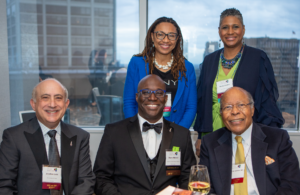
Dr. Jonathan D. Licht nominated Dr. Mitchell for the Award in recognition of his “pioneering work, outstanding leadership, and dedicated service … In addition to being an accomplished scientist and excellent mentor, Dr. Mitchell is an impactful leader at our institution and on the national stage.”
Dr. Mitchell received his BA from Rutgers College and his MD and PhD from Duke University, where he also completed his residency and postdoctoral work. Along with his role as director of the University of Florida Clinical and Translational Science Institute, he is Assistant Vice President for Research; Associate Dean for Clinical and Translational Sciences in the College of Medicine codirector of the Preston A. Wells, Jr., Center for Brain Tumor Therapy at UF Health; and Phyllis Kottler Friedman Professor in the Lillian S. Wells Department of Neurosurgery. Dr. Mitchell was elected to the ASCI in 2020.

